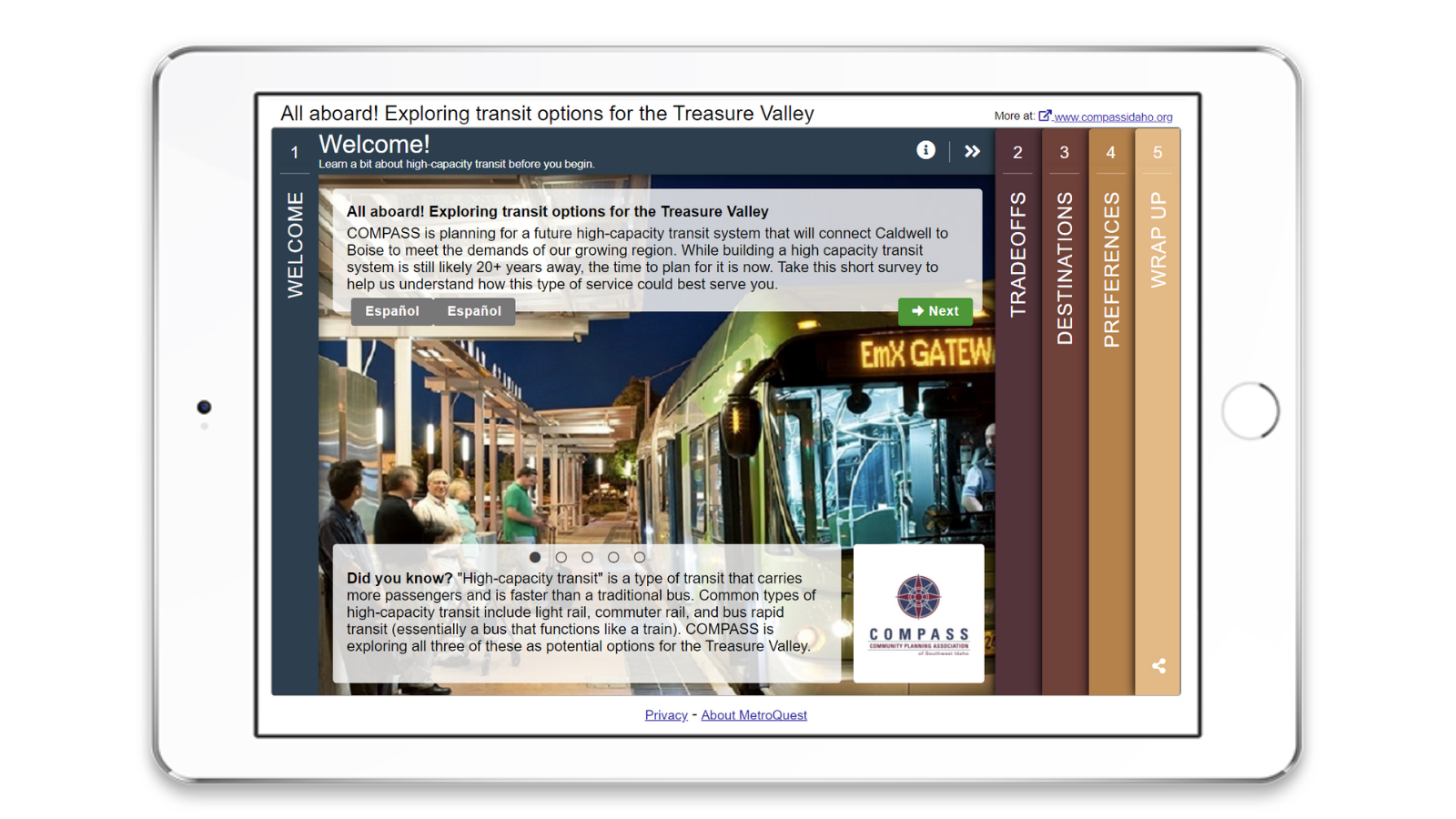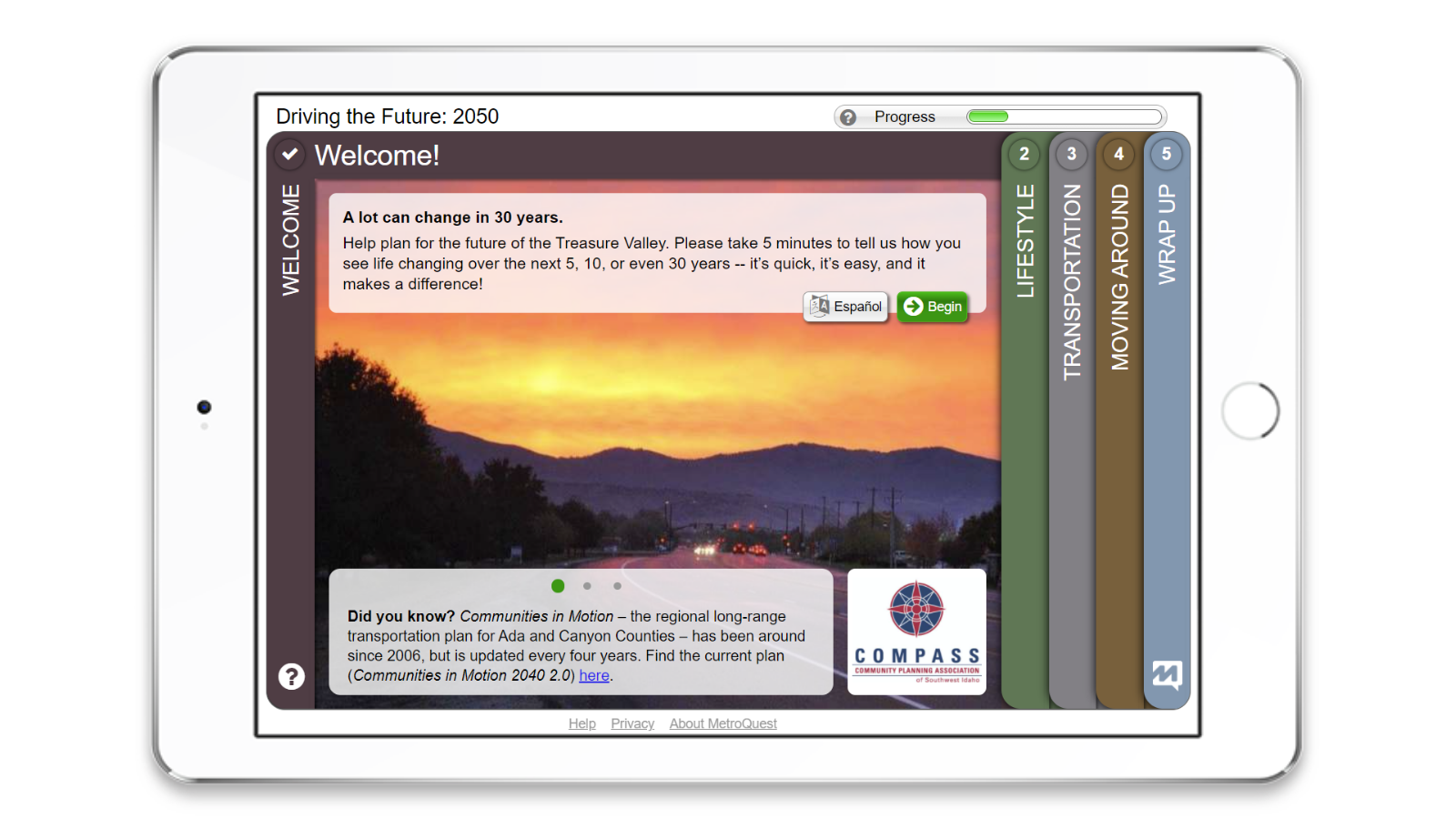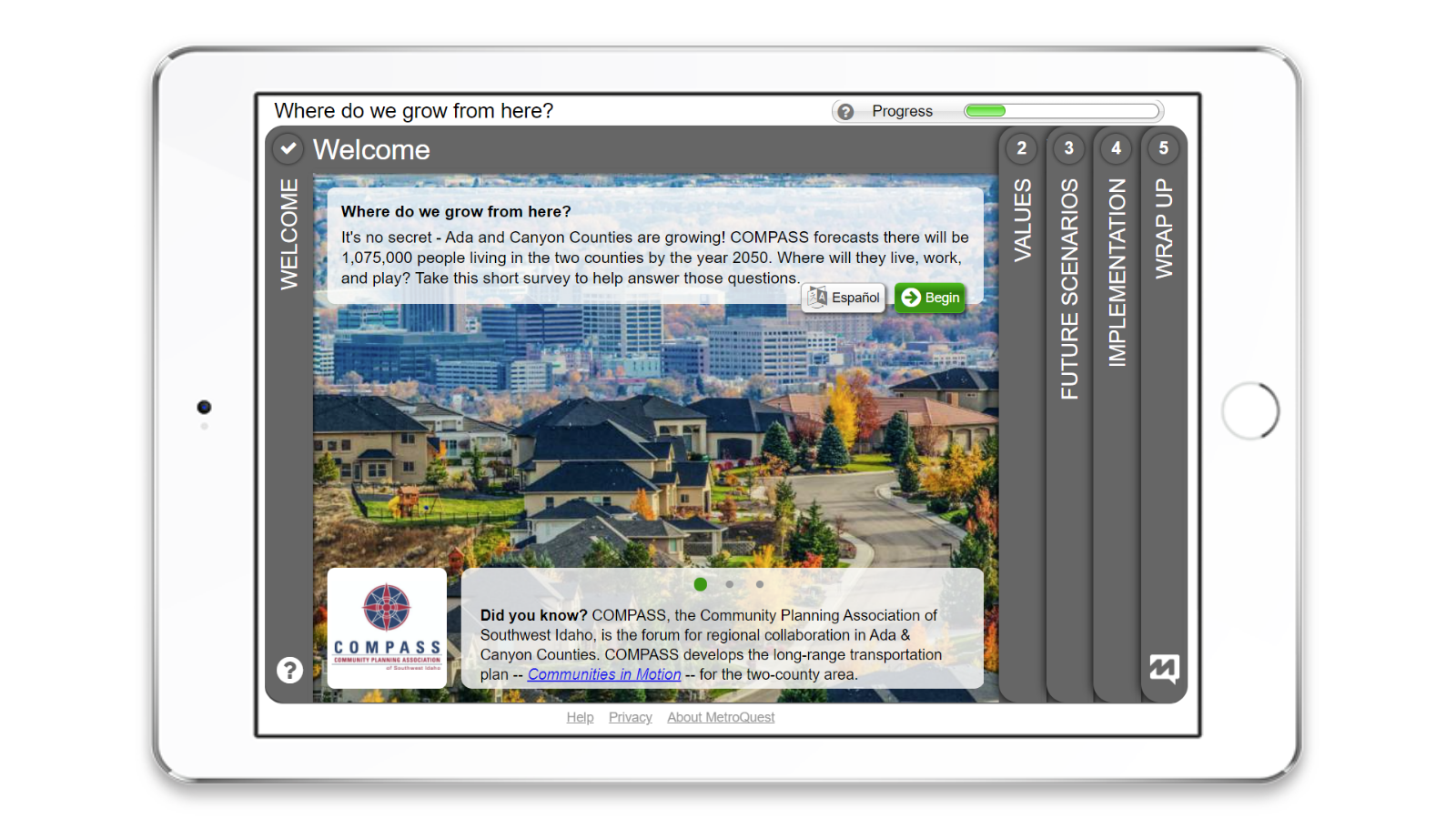COMPASS Gathers Input from 18,500+ Participants to Plan Future Transportation
“We had over 11,700 participants, including 4,000 in one day and 2,500 another day. We were thrilled!” – Amy Luft, Communication Coordinator, Community Planning Association of Southwest Idaho (COMPASS)
Congratulations on your incredible public engagement results!
To help shape the future of the region and determine how Ada and Canyon Counties, Idaho, could grow into the year 2050, local planning officials at COMPASS turned to the public for input and achieved record-breaking results!
With MetroQuest, the COMPASS team achieved:


The Community Planning Association of Southwest Idaho (COMPASS) is an organization made up of local governments that work together to plan for the future of Ada and Canyon Counties in southwest Idaho, an area known as the Treasure Valley. COMPASS serves as the federally mandated Metropolitan Planning Organization (MPO) for Ada and Canyon Counties and is responsible for shaping the future of the region by developing its long-range transportation plan (LRTP) and distributing federal transportation funds to urbanized areas.
The Community Planning Association of Southwest Idaho
The Treasure Valley has experienced unprecedented growth in recent years with forecasts indicating that over 1 million people will call Ada and Canyon Counties home by 2050. To prepare for the anticipated growth, local officials at COMPASS have been working on Communities in Motion 2050, an update to the region’s long-range transportation plan.
“To help plan for what the future holds, COMPASS turned to residents in Ada and Canyon Counties for feedback.”
Public involvement is a fundamental component of COMPASS’ duties. The agency helps to ensure that transportation decisions meet the changing needs of the region and align with the community’s values. With Communities in Motion 2050 underway and scheduled to be complete by December 2022, COMPASS kicked off a project to identify the community’s specific needs and priorities for transportation in the region. One primary focus of the outreach was to evaluate if and how a high-capacity transit service between Caldwell and Boise, Idaho, could meet residents’ needs.
While the agency has used traditional methods to facilitate their outreach in the past, local officials at COMPASS wanted to reach beyond traditional comment forms. The team hoped that an effective online engagement tool would help them reach more people, diversify their outreach and better include Spanish-speaking communities and other traditionally underrepresented audiences.
Amy Luft, Communication Coordinator at COMPASS, described what the agency was ultimately after in an online tool:
“When we were starting the update to our long-range plan, we were really looking for a platform for public engagement to actively engage with the public, but that we could also use to adapt for different types of topics and different needs throughout the planning process.”
The agency also knew that, with limited funds in transit planning, it can be difficult to address tradeoffs or competing needs. Amy said that,
“Finding a platform that would allow us to educate the public about planning alternatives and transit tradeoffs in a fun and engaging way was also really high on our list.”
COMPASS set out to find a dynamic and interactive public engagement tool that would help translate complex transportation information into a streamlined, interactive and educational experience for participants, while allowing their team to adjust for different types of projects to ensure that residents are given the opportunity to weigh in multiple times throughout the planning process.
Selecting the right tool to facilitate public outreach.
After comparing the wide range of public engagement tools that exist today, COMPASS selected MetroQuest as the best in-class solution that aligned perfectly with the team’s needs.
“MetroQuest really provided that platform that allowed us to educate the public and engage with them at the same time in a really fun and interactive way to help ensure that their needs really were heard as part of our planning process.”
MetroQuest is the only survey platform that is purpose-designed to meaningfully engage the public in transportation planning. With microlearning moments embedded into the online survey experience, COMPASS could educate residents about complex transportation topics, ensuring that each participant was well-equipped to provide informed feedback on the project, and giving the technical team data-driven insights to move their project forward.
Plus, with MetroQuest, Amy and her team could create an unlimited number of surveys to support all their outreach initiatives at different points of their long-range transportation plan.
Using a series of surveys to gather input at different points of the LRTP.
In support of Communities in Motion 2050, planning officials at COMPASS planned and created a series of MetroQuest surveys to gather input at different points of the LRTP.
“We just finished the third in a series of surveys that are all supporting the update to our Long-Range Transportation Plan. Each survey built upon the others, but each really addressed a different topic.”
Let’s take a closer look at the three surveys that COMPASS has launched and how each survey was effectively designed to tackle a different topic related to the region’s long-range plan.

“The first survey addressed what types of things could impact the way we’ll grow. The future’s hard to predict and we know that even more now with COVID-19. We wanted to use the wisdom of the crowd, so to speak, to get a sense of how our residents see themselves in the future. We asked questions about things such as future work arrangements, preferred transportation and housing types, and adoption of new technologies.”
Results from the initial survey helped the project team develop four realistic scenarios for what the Treasure Valley could look like by 2050.
The project team used these scenarios as the main focus of the second survey, which also “asked people about their values, how those four different growth scenarios align with how they want to see the region grow, and their support for strategies needed to implement those scenarios.”

Both of the first two surveys indicated that there was public interest in future high-capacity transit for the region, so the third survey took a deeper dive into that. “It asked if and how people would use high-capacity transit,” said Amy, “And, if it did exist, where they would want it to take them. It also addressed tradeoffs between different types of services.”
In a short, 1-minute clip, Amy walks us through the third and most recent survey in the series:
Exceptional survey results gave COMPASS what they needed to move the transportation plan forward.
The MetroQuest surveys gave the project team at COMPASS robust data to help support important regional planning decisions. Collectively, the agency gathered over 500,000 data points of both quantitative and qualitative information:
“We have over eighty-six pages of open-ended comments that we are working our way through as well as some really great information about where people want to go and whether or not people are supportive.”
Amy and her team used the MetroQuest Data Center to monitor, explore, and analyze their exceptional survey results throughout the outreach process. With interactive live dashboards for each survey, MetroQuest allowed the team to auto-generate reports to share results with the public immediately after the survey closed.
“The auto generated graphs that are available at the end helped us share our information right away. We were able to put out a news release with the initial survey results just three days after it closed.”
The data-driven insights that were collected will be used to design a high-capacity transit system that meets the needs of the changing region and reflects what the community truly values.
Reaching beyond those who typically participate to get a true sense of what residents want and need.
COMPASS strives to achieve broad and inclusive community engagement to ensure all voices are heard in the planning process. With MetroQuest, the agency has been able to extend their reach in the community to build broad support for their project, improve public trust, diversify input, and develop a long-range transportation plan that truly reflect the needs of the community!